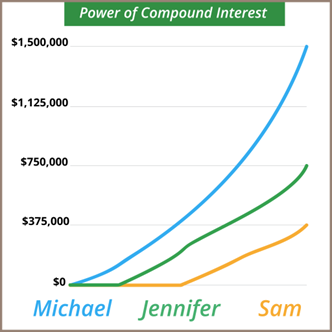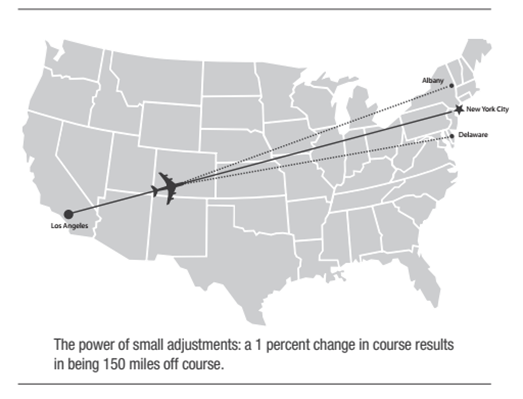Rare Examples of the Power of Compounding and Why the Most Successful People Are Obsessed With It!
The principle of compounding is one of the most powerful forces in the world. Albert Einstein once referred to compounding as “…the eighth wonder of the world.”
Money/Finance
Many of us are familiar with the term “compounding” in relation to finance and saving for retirement. Every month, you contribute a certain amount of money to your retirement fund (commonly a 401K). That’s your investment. You earn interest— let’s say 10%— on that investment. Compounding is when you earn interest on the interest you have received. It multiples your money at an accelerated rate.
For example, if you have $500 and earn 10% interest per year, you will have $550 after one year. Then, if you earn 10% interest the next year on that $550, you end up with $605 by the end of year two. The process continues until, eventually, your original $500 may be eclipsed by the amount of interest you gained.
Ben Franklin put it best: “Money makes money. And the money that money makes, makes money." That is probably the simplest explanation of compound interest you'll ever hear.
I remember something that happened at the first job I had that came with a retirement plan. The benefit consultant came in and gave a presentation on compound interest. He talked about the factors that affect this principle such as when someone starts saving (in their 20s, 30s, 40s…) and how much they save ($50 a paycheck, $100, $200). He showed a graph that looked similar to this one. It blew my mind back then and still does to this day.
The Compound Effect by Darren Hardy
The principle of compounding is not limited to just finance. This can and should be taken advantage of and applied in all areas of your life. There’s a great book on the subject, aptly called, The Compound Effect.
The book has this overriding principle/equation:
Small, smart choices + consistency + time = radical difference
Notice a few key points. As with all instances of compounding, time is your friend! Start early. Start today. There’s a line from the book that says: “Give me enough time and I will beat anybody, anytime, in any competition. Why? Not because I’m the best or the smartest or the fastest. I’ll win because of the positive habits I’ve developed, and because of the consistency I use in applying those habits!”
The most operative part of the equation is choices.
“Every decision, no matter how slight, alters the trajectory of your life”
Here’s a great example: A plane is traveling from LA to NYC. What if the plane was off course by only 1%? Doesn’t sound like much, right? Would the plane still reach its destination? If not, how many miles off course would it be?
The tricky part with compounding is that the initial stages may look very similar. You may say, “I’m doing all this work and nothing is happening. I’m just the same as the other guy who isn’t doing anything.” Patience, young padawan. Remember that the time element is key. Let compounding do its work Stick with it and you’ll notice a huge change. Whether or not it takes a sharp turn towards the goals you want or away from them is up to you.
John Maxwell: “A Compounding Time In My Life”
The great John Maxwell who recently celebrated his 75th birthday in Feb 2022, once said in an interview, “I’m in a wonderful time in my life. I’m in a compounding time in my life. So, why is my life compounding?” He spoke about several aspects. Here are a few that stood out:
“Have the right attitude. We should all seek to contribute more than we consume.”
We should take it upon ourselves to serve others. The Law of the Universe says it’ll come back to you tenfold anyway.
“Personal growth has compounded in my life.”
Make it a point to invest in yourself!
“Success is derived from my daily agenda.”
Again, remember the power of small choices.
“Do not underestimate the power of partnerships. Working together increases the odds of winning together. Mother Teresa once said: ‘I can do what you cannot do. You can do what I cannot do. Together we can do great things.’”
Find partnerships where 2 + 2 = 5 (or 10).
Look for people who will amplify your strengths and good qualities.
If you do all the above, the compounding effect in your life will blow your mind. Life compounds positively and negatively. It’s your choice. It’s all up to you.
Kobe Bryant and Michael Phelps - Compounding in Sports Training
Because I love sports, here are two examples from the sports world. They’re extreme examples but the principles embedded in them helped take Kobe Bryant and Michael Phelps to the top of their games.
Kobe Bryant
Kobe Bryant once said:
“If your job is to try to be the best basketball player you can be; to do that you have to practice, you have to train. You want to train as much as you can, as often as you can. So, if you get up at 10am in the morning, train till 11am or 12pm. You train for two hours. You have to let your body recover. Get back out to training and start training from 6pm till 8pm. Now, go home and take a shower, eat dinner, go to bed, wake up, and then do it again. Right? Those are two sessions.
Now imagine you wake up to train at 4am and continue till 6am. You come home, have breakfast, relax. Now you're back at it again 9am to 11am. Relax again, and then you're back at it again from 2pm to 4pm. And then again from 7pm to 9pm. Look how much more training I have done by simply starting at four.”
We can see compound interest at work here. In the example given by Kobe, the person in the latter scenario is clearly at an advantage. This is because as the years go by, and they continue to stick to their schedule, they’ll eventually be such a huge difference between them and their peers and competitors. It doesn't matter what kind of work the others are able to get done in a summer. They're never going to catch up because they're five years behind.
It makes sense to get up and start your day early because this way you are getting a head start on everybody else. It might not seem like it immediately but with time, all your hard work will produce staggering results. Kobe said, “I can train more hours. And I know the other guys aren't doing it because I know what their training schedule is. So, I know if I do this consistently, the gaps is going to lie in the wind and they won't be able to get that back. So, to me it was just common sense.”
Stop right here and ask yourself, “Am I thinking about how can I get an advantage, a head start? Or do I want to be like everyone else?”
Michael Phelps
Michael Phelps once said”
“I wanted to be the best...So, for me, when I went through a span of five or six years where I didn't miss a single day of training, 365 days a year, that made me different. I got 52 extra days each year that anybody else had and in the sport of swimming, if you miss one day, it takes you two days to get back to where you were. So, everybody else is taking a step back on Sunday when they weren't swimming, and I was taking that one step forward…The greats do things when they don't always want to. I think that's what separates good from great.”
Michael Phelps’ coach, Bob Bowman, took it even further. He knew how to use compounding in a specific time window to give Phelps an edge. According to a New York Times article, “He recognized Phelps’s predisposition to develop gargantuan aerobic capacity and exploited it, ultimately pushing him to swim at least 50 miles each week. He knew that prepubescent children can, through training, increase the size of their hearts and lungs in ways that are no longer possible later on.”
Phelps also shows great mastery of the principle of compounding in other areas: Later on, to keep his lung capacity up, he employed compounding at night. As this article observes, “…To improve his lung capacity and endurance, he had a chamber surrounding his bed that simulated high altitude or elevation. That way, breathing less oxygen became natural for him, and the moments of oxygen debt in his races (last underwater) didn’t hurt him as much.”
Is this an extreme example of compounding? Yes. But let me ask you this. Who holds the all-time record for Olympic gold medals?
Action Items:
Set goals. Be clear about your destination. Where are you trying to get to? The more specific the better. However, if it’s just a general direction or away from something or just not that, those can be good starting points too. It’s hard to know if you’re making good choices if you don’t know where you’re going.
Track your choices for a week (or even a day). Where do you spend your time, what’s on your calendar, where is your mental energy being spent? The following questions might help you figure that out.
Do you watch Netflix for 2 hours when you could be taking a walk around the block for even a portion of that time?
Are you “Just checking social media really quick” and it actually sucks up hours of your day?
Are you doing an activity you hate (and are probably not good at) when it can be delegated or outsourced?
Are you worrying about something when you’ve done everything you can about it?
Are you unnecessarily ruminating over something that is already done?
How many times do you hit the snooze button when your alarm goes off?
Determine/calculate if these choices are taking you closer to your goal or farther away. And remember to think of it in the light of compounding. A Netflix binge every once in a while, might be one thing but consistently doing it over weeks, months, and years adds up, big time.
2 hours a day * 5 days a week = 10 hours.
10 hours a week * 52 weeks = 520 hours a year or 21 days!
Another way to think about this is the opportunity cost. What did you give up by making the choices you did? What could you have accomplished in those 520 hours instead?
Decide on what choices you want to make going forward. And keep a look out for areas that can compound exponentially in your favor over time.
On a final note, remember to invest in yourself today. Use one of the most powerful forces in the world to your advantage. Think of the two versions of you in a year’s time, 2 years, 5 years. Which of those two do you want to be? To accomplish big things, you must be willing to do the little things. Start today.
For more strategies and tips like this sign up for my newsletter.
About The Author
Emily Sander is an ICF-certified leadership coach with more than 15 years of experience in the business world and the author of Hacking Executive Leadership. She’s been featured in several print publications, online articles, and podcasts, including CEO Today Magazine, Leading to Fulfillment, and Leadership Powered by Common Sense.
Emily has a passion for helping business leaders reach their full potential. Go here to read her story from seasoned executive to knowledgeable coach. If you want to send Emily a quick message, then visit her contact page here.




